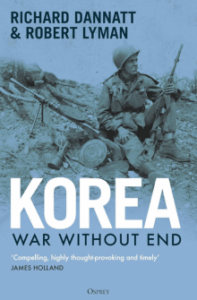This is of seminal importance to our appreciation of the importance of the Korean War. The authors combine strategic military awareness with the necessity of providing historical analysis built on thorough research. What we are offered is a systematic analysis of the causes of the war; the relevance and context of the war in the international power politics of that era; and also guidance into how this war sits in the history of conflict over the last century.
We are guided through the political turbulence that occurred in 1945 when Stalin, with whom the Western powers had so closely collaborated in defeating Hitler, reverted to a traditional Soviet strategy of wanting weak, compliant neighbours, ‘puppet states’ as part of a protective screen for Russia. In the West we saw the Soviet domination of Eastern Europe but we are led to understand that Russia also saw the Korean peninsula as another aspect of this defensive bulwark, thereby providing the seeds of potential enmity and conflict.
Equally we are introduced to tactical realism in the strategies employed. Dannatt and Lyman make it quite clear that the war could have been completed in 1951 if shrewd military judgements had been made. The desire to fight back over the 38th Parallel was influenced by policy approaches arising from Appeasement in the 1930s. The decision to try to defeat North Korea was, in essence, an attempt to avoid replication of how the European powers had reacted to Hitler’s successive seizures of territories in the late 1930s. The difficulty with this was that the North Korean leadership was ambitious in wanting to consolidate its dynastic regime, with the extra impetus of Russian and Chinese support strongly available in that location.
There was also an element of misreading how the dynamics of world politics had changed sharply. Stalin was determined to restore Russia’s standing and the now- dominant Chinese Communist Party had taken control of mainland China. Both nations had the potential to field very substantial armies. It is this lack of awareness that led to the second and longer phase of the conflict which, in effect, has never been concluded.
At the end of this highly significant book, the nuance of its title is revealed, literally in the last sentence. Dannatt and Lyman are advising us that what we might have imagined was a ‘war without end’, in that a Korean Armistice in 1953 has left us with a fragile border without a peace settlement, is what they see as part of a continuing and wider ‘war without end’. What they have done throughout this extraordinarily well-argued and well-researched book is to make us extremely conscious that political and diplomatic interactions across the globe are all interrelated, or at least politically so. Ukraine, Gaza, the South China Sea and Greenland, as examples, are so seemingly unrelated and different, and yet how they are handled is part of a wider perspective which we need to recognise and we will have to manage the consequences of how they are addressed. This volume quite rightly has the potential to serve as an aide-mémoire for anyone planning to participate in international diplomacy.

Trevor James was the editor of The Historian from 2006 to 2019.






